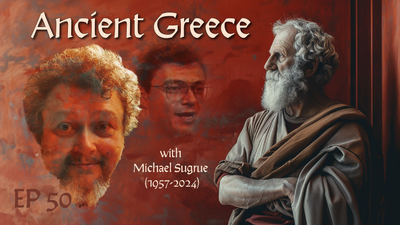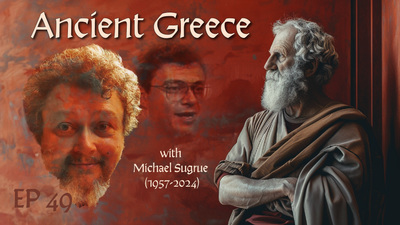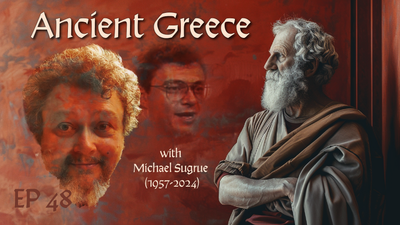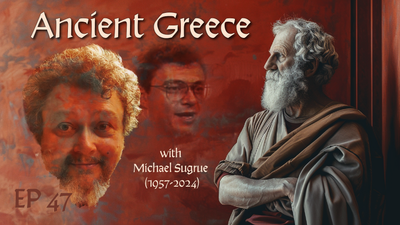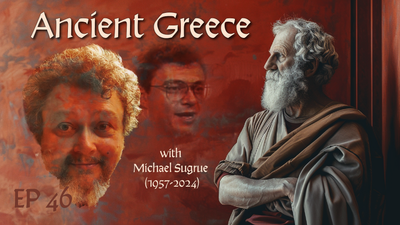In exploring human frailty, Plato invites us to consider the humbling journey of seeking wisdom despite inherent limitations. Plato’s dialogues reveal that wisdom doesn’t emerge from having all the answers but from recognizing the limits of our knowledge. For instance, Socrates famously claimed that his wisdom lay in knowing what he didn’t know—a paradox that has resonated through the ages. This week, we look closely at Charmides and its exploration of self-control and the pursuit of temperance as a means of understanding our boundaries and, ultimately, our potential.
While we may not face the same challenges as the ancient Athenians, the struggles of pride, overconfidence, and rashness remain universal. Plato’s reflections urge us to pause and reflect: How often do we mistake ambition for wisdom, or confusion for ignorance? By engaging with these questions, we not only follow the path of the philosopher but also bring Plato’s insights into our contemporary lives. Engaging with these ideas on planksip.org allows us to join a community that collectively imagines a world where the personification of Plato inspires critical thought and self-awareness, igniting a modern “search for wisdom.”
From the Archives of Ancient Greece: Featuring Dr. Michael Sugrue
Dr. Michael Sugrue delves into the theme of human frailty, a central element in the journey of any philosopher, and illuminates how acknowledging our weaknesses is the first step toward meaningful wisdom. Sugrue emphasizes that Plato doesn’t present frailty as a flaw; rather, it is an honest lens through which we view ourselves and grow. In his reading of Charmides, Sugrue explains that Plato suggests that strength is not merely overcoming weakness but embracing it, recognizing the limitations of one’s power and knowledge.
Consider the modern-day experience of decision-making. Whether it’s a CEO contemplating a risky merger or a student weighing career options, we all have moments of self-doubt. Sugrue reflects that Plato would encourage these individuals to see such moments as a natural part of their journey. Instead of recoiling, they should reflect, and perhaps question what their fears reveal about their desires or values. This interpretation turns the notion of “weakness” into an ally, a guide that points us toward the growth we most need. Readers are encouraged to explore these ideas further and share their own reflections on planksip.org, joining a dialogue that brings ancient wisdom into today’s world.
Insights from the Dialogues: Socratic Wisdom and Human Limitations (Charmides, 165b-169c)
In Charmides, Socrates engages young Charmides in a dialogue on temperance, exploring what it truly means to “know thyself.” Socrates challenges Charmides to see that self-control and self-awareness aren’t mere virtues but essential aspects of living wisely. He likens self-knowledge to a compass guiding one’s choices, suggesting that wisdom requires understanding our limits. This notion aligns with modern self-reflection practices, like mindfulness, where observing oneself can illuminate blind spots and biases.
Socrates’ approach here is a powerful example of how wisdom emerges from humility. In contrast to today’s “fake it till you make it” mentality, Socrates champions honest self-assessment. He argues that only by knowing what we don’t know can we begin to understand what’s truly worth pursuing. This timeless advice can still resonate in our fast-paced world, reminding us to slow down and check if we’re building our lives on a foundation of genuine understanding or on precarious assumptions. By contemplating these themes in our own lives, we embody the spirit of Socrates and can bring our insights to the wider philosophical community at planksip.org.
Chance and Fate: Ancient Games and the Wisdom of Acceptance
Games of chance, such as the popular knucklebones, were more than entertainment in ancient Greece—they served as powerful metaphors for life’s uncertainties. Ancient Greeks believed that games could teach players how to accept outcomes beyond their control, embodying a kind of stoic resilience. Just as one cannot control the roll of dice, there are aspects of life—illness, unexpected setbacks, or unanticipated successes—that lie outside our influence.
Explore the Mystical World of Astraguli: Ancient Games of Chance with Cultural Significance.
Plato’s society saw games of chance as reminders to accept life’s randomness while focusing on cultivating virtue. Imagine an ancient Athenian child playing knucklebones and learning, perhaps unknowingly, the value of resilience. This early lesson speaks to a universal truth: we may not control every outcome, but we can control our reactions. Such games, steeped in symbolism, remind us to balance action with acceptance, striving where possible and embracing humility where necessary. Engaging with this concept today can help us approach life’s uncertainties more philosophically—by playing our “game” on planksip.org, we can explore what it means to accept fate while pursuing wisdom.
Virtues Revisited: Practical Lessons for Today – Temperance
Temperance, or self-restraint, is the ability to balance desires with reason. Plato considered this virtue foundational for any philosopher seeking a harmonious life, as it counters impulsiveness and overindulgence. In our modern world, where instant gratification is often a click away, temperance reminds us to practice restraint, ensuring our actions align with long-term values rather than fleeting desires. Whether it’s refraining from an unnecessary purchase or choosing words carefully in a heated conversation, temperance allows us to act with wisdom.
Take, for instance, the challenge of balancing social media use. The pull to constantly check notifications can consume time and energy, often leaving us feeling drained. Practicing temperance by setting boundaries fosters a sense of control, allowing us to reclaim our attention and invest it in pursuits aligned with our values. Such actions mirror the self-restraint Plato advocates, and they provide a concrete path toward inner peace and growth. By reflecting on and sharing our journeys toward temperance on planksip.org, we can connect with others on this philosophical journey, supporting one another in the pursuit of wisdom and virtue.
Engage with Us: Reader’s Corner
As we reflect on the role of human frailty in the quest for wisdom, we invite you to join us in examining these timeless themes. How do you experience the balance between ambition and self-awareness in your life? Have there been moments when recognizing your limitations led to unexpected growth? Share your insights, anecdotes, or reflections in our Reader’s Corner on planksip.org, where we engage in ongoing dialogue about these ideas. Selected contributions will be featured in upcoming issues, helping to build a community that values the exploration of life’s deeper questions through the lens of ancient wisdom.
Closing Reflection: Socrates’ Enduring Legacy
Socrates’ insistence on acknowledging human limitations is a call to self-reflection that transcends time. In embracing our weaknesses, we discover the potential for transformation and growth. This humble acceptance of our limits does not diminish us; rather, it opens us up to continual learning. Just as Socrates found strength in recognizing his ignorance, we, too, can find freedom and wisdom in embracing our imperfections. Let this reflection on human frailty and resilience guide us in our own philosophical pursuits, reminding us that the path to wisdom often begins with a single, honest question.

Plato Re-Imagined
This course offers 32 comprehensive lectures exploring most of Plato's dialogues. These lectures guide students toward a consilient understanding of the divine—a concept that harmonizes knowledge across disciplines and resonates with secular and religious leaders. As a bonus, Lecture #33 focuses on consilience, demonstrating how different fields of knowledge can converge to form a unified understanding.


